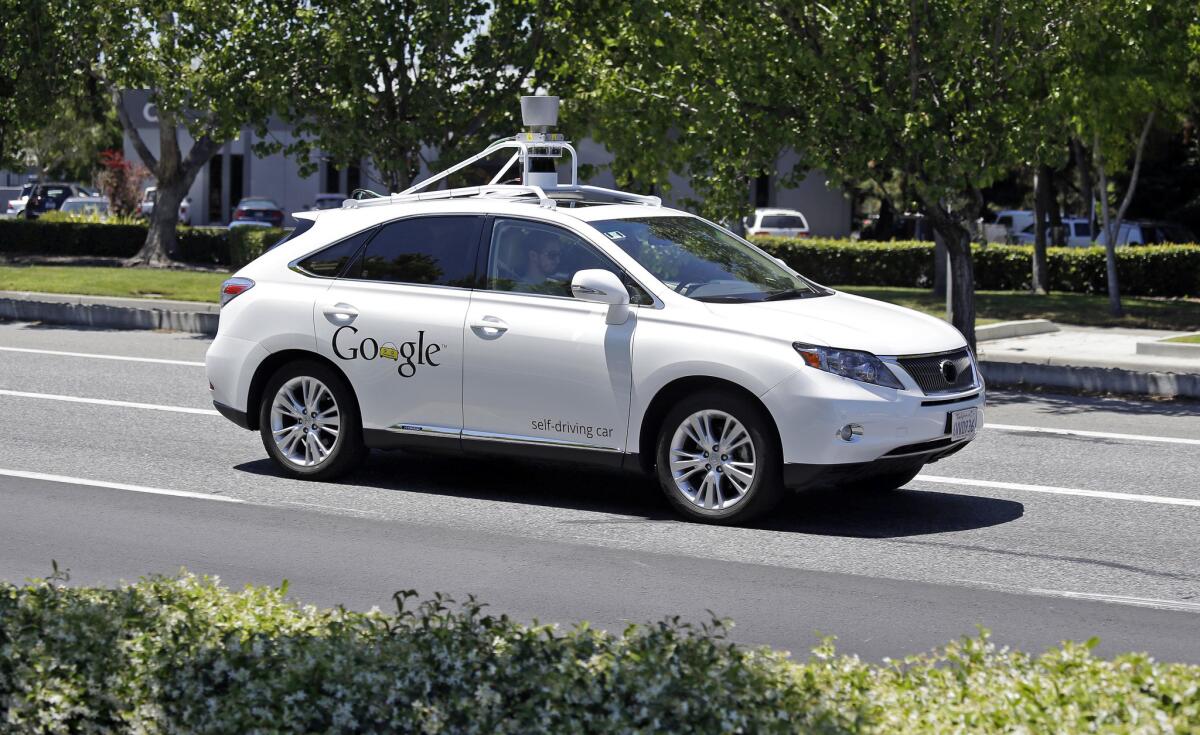California reveals details of self-driving car accidents

A Google self-driving Lexus at a Google event outside the Computer History Museum in Mountain View, Calif.
California state officials released reports Thursday detailing six accidents that involved self-driving car prototypes, reversing a policy that had shielded details of how the next-generation technology is performing during testing on public roads.
The disclosure came after the Associated Press successfully argued to the Department of Motor Vehicles that the agency was improperly withholding the information.
According to the reports, most of the cars were in self-driving mode when the accidents happened, and the other driver caused the accident. None of the crashes were serious enough to injure the person the state requires to sit behind the wheel, and the reports say none of the people in the other cars were treated for injuries either.
The companies that operated the cars — tech titan Google and parts supplier Delphi Automotive — submitted their own accounts of the accidents. Police have only confirmed investigating the Delphi crash.
Led by Google, self-driving cars have been running on public roads since 2009. It was only in September, however, that the DMV officially began permitting the testing — and specifically requiring companies to file accident reports.
Until now, the agency said it could not reveal details about self-driving car accidents, citing state law making collision reports confidential.
The fact that the agency refused to release the reports bothered critics, who said the public should know how the cars of the future were faring today.
After the DMV denied a public records request, AP argued that the agency was incorrectly citing the confidentiality requirement and that the public has an interest in understanding how these experimental vehicles are performing as they drive public streets and highways.
In a letter that accompanied the documents, DMV attorney Roger Sato wrote, “After further review, DMV has determined that it is possible to release the factual information related to the autonomous vehicle reports” as long as the drivers’ personal information and other details such as insurance information is blacked out.
While seven companies are licensed to test 48 self-driving cars in California, Google cars have driven the most miles driven (about 1.8 million) and built the most prototypes (23).
After several years of secrecy, Google has in recent weeks become more open about the number and nature of its accidents.
After AP reported last month that there had been three Google accidents and one Delphi accident, Google self-driving car project leader Chris Urmson revealed in a blog post that its cars had been involved in eight other accidents between 2010 and July 2014.
DMV officials had not been aware of those eight until an April conference call with Google, agency spokeswoman Jessica Gonzalez said.
In California, a driver is required to report to the DMV any accident involving more than $750 of property damage.
A Google spokeswoman could not say whether the company had filed reports on any of the initial eight accidents to the DMV, and said she could not provide damage estimates because repairs were done in-house, without a bill.
The DMV said it could not search its records for earlier reports without date and location information that Google has provided to neither AP nor the agency.
At Google’s annual shareholders meeting earlier this month, co-founder Sergey Brin told a longtime critic with the nonprofit Consumer Watchdog that releasing accident reports would serve no purpose because Urmson’s blog post detailed the accidents. Two days later, Google launched a website which offered short narratives describing each collision.
More to Read
Inside the business of entertainment
The Wide Shot brings you news, analysis and insights on everything from streaming wars to production — and what it all means for the future.
You may occasionally receive promotional content from the Los Angeles Times.










